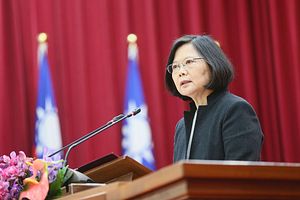Days after the Chinese Communist Party (CCP) revealed its new generation of top leaders, Taiwan’s President Tsai Ing-wen made a public speech on cross-strait relations, calling for a breakthrough with China. It’s a rare direct message from Tsai to the Chinese authorities since she came into office last year. She had made few direct talks on cross-strait relations except the address given on the day of her inauguration.
On October 26 — two days after the CCP’s 19th Party Congress — Tsai attended a conference specifically on “the cross-strait relations in 30 years” and made a keynote speech.
In her speech, she recalled the thawing process between the two sides since 1987 in detail. Particularly, she mentioned that “in 1992, we held talks with the other side in Hong Kong and launched the cross-strait institutionalized consultations, including the remarkable talks between Wang and Gu in the 1990s.”
As most observers of cross-strait relations know, what Tsai was describing here is the history behind what is now know as the “1992 consensus,” In 1992 the CCP of the People’s Republic of China (PRC) in mainland China and the Kuomintang (KMT) of the Republic of China (ROC) in Taiwan held a series of talks and finally reached the 1992 Consensus, or agreement that there is only one China.
Since Tsai of the Democratic Progressive Party (DPP) came into office, Beijing has kept demanding that Tsai “acknowledge the historical fact of the 1992 consensus,” but Tsai, in a very diplomatic way, maintained her stance on referring to the “ 1992 consensus” as the “1992 talks,” which is a slightly different wording, but a significantly different policy in Beijing’s eyes.
In her latest speech, Tsai intentionally described the “historical facts” in a clearer way and declared that “the DPP government respects not only the historical facts, but all the agreements that have been signed by the two sides and that have completed the legislative process.”
In a direct message to the CCP, Tsai said:
The Chinese mainland’s ruling party has just completed the Party Congress and entered a new stage… Right now is a turning point for change. I once again call on leaders of both sides to … seek a breakthrough in cross-straits relations and to benefit the long-term welfare of people on both sides and to forever eliminate hostilities and conflict.
Although Tsai appeared to have already made an effort to meet Beijing’s preconditions for resuming dialogue, Beijing seemed still discontented.
In response, China’s Taiwan Affairs Office (TAO) said on October 26 that the “one China principle” is the political basis for the cross-strait relations.
“Only by returning to the political basis of the ‘1992 consensus’ can the both sides return to a bright relationship and open up new prospects,” TAO said.
Yet, it’s worth noting that TAO’s tone was apparently softer compared to the past, nor did TAO completely close the door on resuming dialogue.
“Our attitude toward Taiwan’s various parties is open and and our standard is consistent. [As long as the party] acknowledge the historical facts of the ‘1992 consensus’ and that both sides belong to one China, a dialogue can be carried on between both sides,” TAO added.

































